- From Faith Current: “The Sacred Ordinary: St. Peter’s Church Hall” - May 1, 2023
- A brief (?) hiatus - April 22, 2023
- Something Happened - March 6, 2023

Geekin’ out with Conan and Lewisohn.
Comedy legend (and serious Beatle fan) Conan O’Brien has just interviewed Beatle legend (and serious Beatle fan) Mark Lewisohn on his chat show “Serious Jibber-Jabber.” It’s well worth a listen.
“Most of the books you have read, upon which you base your knowledge,” Lewisohn begins, “in terms of biography they only skim the surface. The writers will take a year or two. And in that time, they’ll do six to nine months of research, six to nine months of interviews, and then they’ll write. I always felt this was a subject that would merit much deeper research. And it’s shown, because I found so many people who’d never been [interviewed for] a book before, who tell completely different stories. Particularly the documents tell a radically different story.”
Said it before, I’ll say it again: we all owe Mark Lewisohn a tremendous debt. If his three-book advance runs out before he’s done, I’ll run a Kickstarter to get it finished. It’s that important. He’s in a sweet spot — the Beatles story is pretty much concluded, but many of the most important sources are still alive. Now is the time that the history should be codified.
Anyway, go watch it at Team Coco. H/t to @Rose Decatur!

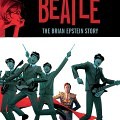
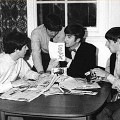

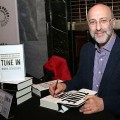
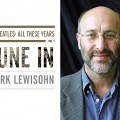

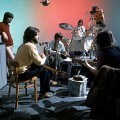


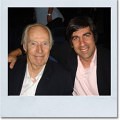
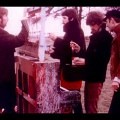
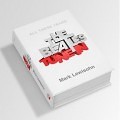
Mark Lewisohn must be kept alive at all costs. My worry is that he’s getting old. He needs around the clock medical attention, as well as a team of cardiologists to keep him healthy.
By the way, I can’t hear “jibber-jabber” without being reminded by Mr. T that that is precisely the thing I should quit.
Joking or not, I keep hearing variations of this sentiment. The man is 57 years old. He’s not a Galapagos tortoise for fuck’s sake. If he finishes by 2027, he’ll be under 70. Still the prime of life as far as I’m concerned.
Right. Here’s hoping Lewisohn has McCartneyesque energy well into his 70s!
This is a very good interview, I’ve watched it twice now, sitting in my mountain lodge caught in torrents of rain for a few days.
.
What I really like about an interview like this, that it undermines most fan-phantasies based on nothing but air. The best thing both Conan and Lewisohn concluded was that the Beatles started to separate the moment they got together, because of their curious personalities – and of course the stopped at their best moment,: they wanted to stop, ok, McCartney didn’t want to stop, and other configurations would have been possible. They’ve stopped, and that’s good.
.
About Kickstarter. Well Michael, I suggest to kickstart your kickstarter because quite a few times Mark Lewisohn has explained that the research needed for the level of quality he aims for is very hard to achieve on his own. He doesn’t have a supporting staff, and that’s what he might need. My financial instinct suggest $ 200.000,- per year is needed to raise the level of research to what would make all of us very very happy. It also might speed up things a bit. It is easy a few millions in the long run (over ten years)
.
@Rob, I couldn’t do it without Lewisohn reaching out to me first, but I think that number seems like a fair guess, and I’d be happy to speak with him about the ins-and-outs of how it might work.
Good point, Chelsea. I respect Lewisohn’s work and I believe he’s trying to be objective, but it is worth recalling that he is only human. Anyone who writes more than the simple facts (X went here on this date; this was recorded on Y date in Z studio) can’t help but inject an interpretation. (And even recording the “simple facts” isn’t really immune from interpretation.)
Thanks, Nancy.
I just finished this video (which, damnit, I didn’t want to spend the time listening to this, but it sucked me in!)… and I’m sorry, but the idea that the Beatles gracefully exited the stage at the correct time is also a fanwank! I’m not saying they shouldn’t have broken up, but let’s be real. That break-up was a huge, traumatic, embarrassing mess that John and Paul in particular dragged out (publicly) for years.
Sorry. I guess I’m just eye-rolling a bit on Conan and Lewisohn talking like they are these mature, objective wisemen and everyone else is a delusion myth-consuming fan (including Paul and Ringo themselves). Like… calm down, guys. 😉
Lewisohn’s emphasis on documents — especially contemporaneous ones — pleases the researcher in me immensely. And I would donate to a Lewisohn kickstarter fund.
Great find, Rose. Thanks for sending it our way.
Full confession: Tune-In bored the crap out of me. The documentation of minutiae Lewisohn is noted for makes me want to shove a fork in my eye (although I give Lewisohn kudos for reading back issues of the Liverpool Echo; that alone must have required copious amounts of alcohol.)
At this stage of the game, I’m only interested in books–which have yet to be written–which explore the Beatles’ relationships, and how the nature of those relationships impacted their music and the trajectory of their success. I tire of hearing about Paul’s tantrums and John’s contrary personality like they are cartoon characters (although I give Lewisohn credit for offering a bit of insight into young John’s orientation to leadership, although any insight into Paul’s personality was woefully absent).
I want more, and I think Lewisohn is capable of offering more; I just don’t feel like I’m getting more.
I caught the prima donna comment as well. It gets tiring.
Perhaps we don’t get more because the “more” is essentially speculation? I personally feel the same way — I want books on the relationships — but one need only look at our recent threads to see how fundamentally divisive that is. I find it incredibly unpleasant and demotivating, and Lewisohn would face that times a million. You can understand how he’d stick to document-scrounging.
Maybe–but the speculation is happening anyway–it’s unavoidable. It’s just that it’s not being done as accurately as it should be.
I’m waiting for the book, for example, that sees Paul’s bossiness in these terms: the oldest son who loses his mother, with whom he has a particular bond, in his early teens; a boy who discovers the guitar as a tonic for his grief and untapped creativity; a left-handed boy, forced by his teachers for many years to write right-handed, but fails (being left-handed myself, it wasn’t a picnic in the 60’s and I’m sure it was worse in the 40’s and 50’s); a boy whose left-handedness was not understood in terms of brain lateralization and cognitive processing, which could explain why that boy was likely a gestalt learner–someone who conceptualizes things in their gestalt, or wholeness, rather than in their sequential parts, thereby explaining why this kid came to the studio with the entire song thought out–he wasn’t being uppity–it was simply how his brain worked; how this style of learning shaped the creative process, which put him at odds with his bandmates, particularly George, who by all accounts was perhaps a sequential learner, approaching the creative process in a way diametrically opposite to Paul; how this boy grew up to be a man who became perfectionistic, maybe even bossy, because that’s how he managed to maintain a sense of control, living the most bizarre life imaginable.
That’s the story I’d want to read.
You should write that book!
Ha–I was hoping you would. 😉
Just because you keep mentioning it, Chelsea, doesn’t mean the observation isn’t perfectly valid, and the topic deserves in-depth discussion. The tendency by many Beatles writers to describe Paul in predominantly feminine terms *is* there — and the implication that this “feminine” association therefore somehow lessens Paul’s role in the band, makes him less authentic, etc. — is also there. There’s a thesis (or at least a post) in there somewhere.
@Chelsea, what part of the interview raised your ire? Was it him calling Paul a “prima donna”?
Yes.
IIRC, @Ruth, there have been several posts about this. Certainly it’s been discussed ad infinitum in comment threads. And the sexism of rock criticism, etc.
This is the only online Beatles thing I have any contact with so I wouldn’t know directly from experience, BUT I assume (with about 99% confidence) that there are Beatles spaces on the internet that would absolutely not tolerate any sort of feminist critiques or views at all. So there exists the possibility that some of us are just very excited to be able to speak openly from a feminist standpoint without being shouted down or banished. Maybe – I certainly can’t speak for anyone but myself. For me, personally, I try to exist only in spaces that don’t require me to apologize every time I make a feminist point.
Fair enough, but I’m growing impatient with how every thread seems to come back to Paul, his maltreatment (by John, by Norman, by h8ters on other sites), and a pretty direct identification with Paul and His Struggles. Lewisohn and Conan touched on a LOT of issues over nearly 90 minutes, and yet we’re beached on these same shoals. How is this better than a site that constantly lionizes John? I’m hoping for more diversity of viewpoint.
I think we’ve discussed it on a macro level, but not in terms of whether sexist attitudes were held about and communicated toward Paul by the other three Beatles. John, for example, often called Paul “pretty”, but George and Ringo never did. I never felt that John intended it as a put-down per se, but there’s the example just the same.
In “How Do You Sleep” he certainly intended it as a put-down.
There’s also a quote in the hagiographic “The Ballad of John and Yoko” booklet (published by Rolling Stone in 1982, which should tell you all you need to know). One of the essays is from Harry Nillson, who was recounting a conversation with John during the Lost Weekend where John was discussing how and why the other Beatles entered the band. His quote regarding Paul is tumblr-famous — “I’m just like everyone else, Harry; I fell for Paul’s looks” — until you consider that the context of the quote is regarding why John wanted and asked the other members to join the band. Which then implies that John asked Paul because of Paul’s appearance.
In “How Do You Sleep” he certainly intended it as a put-down.
Yes, in particular the “a pretty face may last a year or two” line.
There’s also a quote in the hagiographic “The Ballad of John and Yoko” booklet (published by Rolling Stone in 1982, which should tell you all you need to know). One of the essays is from Harry Nillson, who was recounting a conversation with John during the Lost Weekend where John was discussing how and why the other Beatles entered the band. His quote regarding Paul is tumblr-famous — “I’m just like everyone else, Harry; I fell for Paul’s looks” — until you consider that the context of the quote is regarding why John wanted and asked the other members to join the band. Which then implies that John asked Paul because of Paul’s appearance.
Interesting you mention that one. I always interpreted that comment as John’s acknowledgement of finding Paul attractive and of being attracted to him, rather than seeing it as a slight.
Edited to Add: I also remember reading a story by one of the Maysles Brothers. The band was being shepherded around New York during their first visit, and when they came to a stop the fans swarmed the car, as usual. They all sat there, unsure of what to do next, and John playfully said “Send Paul out first, he’s the prettiest.” 🙂
“George and Ringo NEVER did”?
That’s a pretty big assertion, and if we’re going to launch into a whole new whirligig, I for one would want a bit of citation. My impression is that all of the Beatles were aware of Paul’s looks, popularity with women, ability to empathize, tendency toward ballads and sentiment — as was the rest of the world — and to make it about John vs Paul is a big leap requiring more than just an impression.
Also? Paul’s a cis-male heterosexual product of (and massive beneficiary of) patriarchy. Of late there’s been a persistent tendency to cast him as a proxy for the female, or intentionally subverting gender, which is quite bold to say. Occupying a “softer” spot on the masculine continuum, yes. But anything more than that requires a lot of assumptions, which makes the point interesting in an Internetty kind of way, but not more than that–at least until Paul himself addresses it.
I’m not sure of why you react so vehemently. It’s a simple statement of fact. I am not aware of instances where George or Ringo called Paul pretty or referenced his looks in that fashion.
John called Paul “pretty” in the early days, in a kind of John-esque style acknowledgement of Paul’s appearance. In HDYS, it was used to demean Paul and his accomplishments. He didn’t sing “a handsome face”, he sang “a pretty face.” Diminishing someone’s accomplishments based on appearance is characteristically a tool used against women, so the sexist parallels get drawn. Make of it what you will.
I don’t know what you mean by calling this line of inquiry “internetty”, other than to suggest it’s stupid and baseless.
In my opinion, I don’t think it is. Am I saying that the other Beatles held sexist views toward Paul? No. Am I asking whether Paul’s looks could have been used against him when shit started to hit the fan by his fellow bandmates, in a way commonly used against women–yes.
@Karen, I’m not being vehement. I am, however, annoyed with the turning of every comment thread to the same issues. Conan and Lewisohn touched on a million different things, and here we are back talking about how John’s a jerk (HDYS), and Paul’s a stand-in for the struggle of women against sexism, an interesting but loose-fitting point akin to saying Yoko is a stand-in for the struggle of all Japanese people. An interesting thought? Sure. But one of many.
Both John’s jerkiness and Paul’s more feminine coding are perfectly in-bounds issues, but ones that we’ve covered substantially, and certainly a whole lot lately. And, more importantly, ones that seem to stop every thread dead in its tracks. In the Norman thread, we actually had someone say that she’s reading Norman’s new Paul bio and liking it a lot — that’s news, given the vitriol that’s been poured over Norman by the Paul Brigade — yet it passed without much comment, because it doesn’t feed the meme. I feel like we’re tapping into a vast pool of rage and hurt that people have, but it’s not really very much about The Beatles.
“Stupid and baseless” are your very harsh words, not mine. What I mean is that internet comment boards are too often a screen upon which fans project their own experience under the guise of discussing an object of popular culture. Once again, this is perfectly in-bounds behavior, but when it becomes all that a site does, I’m not really interested in running a site like that, nor moderating its comments, nor dealing with a lot of inappropriate lashing-out at me.
“Paul’s looks could have been used against him when shit started to hit the fan by his fellow bandmates, in a way commonly used against women”
But you didn’t type that. You typed “John, for example, often called Paul “pretty”, but George and Ringo never did.” To which I wrote, “That’s a pretty big assertion, and if we’re going to launch into a whole new whirligig, I for one would want a bit of citation.”
Asking you to cite a point is not vehement. This conversation is very internetty.
Paul’s being “prettier” than the others was so taken for granted that it became a bit of a joke … and actually became a quip that was put in George’s mouth in Help!:
George: I’m always getting winked at these days. It used to be you didn’t it Paul?
(I always loved that line, for some reason.)
A scripted line, so it probably doesn’t count as George (as opposed to “George”) saying it. But I think it’s evidence that Purdy Paul was such a meme that even the other Beatles assumed it.
Ironically, it was John who expressed outrage, afterward, at the laziness of the characterization in Help!
I am enjoying Norman’s Paul bio so far. Yes, it has lapses, but this far they’re not so much specific to Paul as general to Norman’s tendency to look only glancingly at the music. For instance, he asserts that “Fixing A Hole” is about the kind of DIY project Paul had started doing in Scotland, as distinct from the kind of triply songs John was writing for Pepper. (Pretty sure that the ‘hole’ Paul was fixing wasn’t really on the roof of his farmhouse). But Norman did that to John too, as I recall.
It is important to keep in mind that Paul McCartney is, as you say, a white male heterosexual who’s enjoyed all the privileges that entails. One of the things that stands out in Norman’s book is how sexist all the Beatles were, and the whole culture of the time was.
For instance, he asserts that “Fixing A Hole” is about the kind of DIY project Paul had started doing in Scotland,
Nancy thanks for bringing that up. As much as I enjoyed Norman’s book, no author is perfect so there were still some mistakes. I could have sworn that Paul himself said in Many Years From Now that Fixing a Hole was a metaphor, the entire song was metaphorical, and no he did not fix the roof of his farm house himself at that age. He didn’t start doing DIY projects like that until after he married Linda. It annoyed me a bit to find a mistake like that at such a late date, especially since I know Norman used Many Years From Now as a source and one of his many fact checkers for his book was none other than Barry Miles himself! But this is just the kind of thing you mentioned when you compared a prose stylist like Norman to an historian like Lewisohn. Lewisohn would never let a mistake like that get into the final manuscript of his book. In fact he’d probably have a page on Fixing a Hole with cited proof that it was a metaphorical song. I don’t think for a minute however, that Norman made this mistake because he has an agenda. I really think it’s just a mistake. I agree that he doesn’t emphasize the music enough. I don’t know how far you are in the book but you may be happy to know he does emphasize the music more as the book progresses. Norman is a literary guy of course…no surprise there…so it’s not surprising that he focuses on lyrics most of the time. What is so refreshing for me is that he recognizes Paul as a major poet and literary guy as well. Norman’s discovery of Paul as a lyrical poet is palpable throughout the book. He also praises and gives in depth discussions of his classical works as well. But yea there are mistakes peppered throughout the book. Not a lot but they are there. Another mistake his Norman’s assertion that Paul had no hand in the writing of Norwegian Wood. Oh Christ Mr. Norman he wrote half the song, hence his singing on it. But he more than makes up for these annoying mistakes because the book asserts that Paul is every bit the genius that John was. I’m interested in your thoughts so far Nancy.
I too see the misreading (IMO) of “Fixing a Hole” as just a plain old mistake and not evidence of bias, Linda. And I agree that Norman conveys respect for Paul’s musical and lyrical gifts — refreshing and surprising!
I just think Norman is off sometimes in the way he interprets or characterizes the song. If the hole in question is one that “stops my mind from wandering where it will go,” that’s a big clue that it’s not a simple DIY project under discussion.
And he says that “Picasso’s Last Words” is a country song, which to me is just weird. Doesn’t sound country to me!
Norman makes a lot of mistakes like that. He doesn’t seem compelled to think about his subject that intensely. People say he’s a John guy, and he is, but I noticed the same oversights in the Lennon book. Norman writes the myth version of the story for people who want to read something interesting, not too heavy, about John or Paul. It surprised me that the Ballad and John and Yoko version of the Dakota years made it into the Paul book without even a sideways word to cast doubt on the official narrative: John gave up drugs and spent five years raising Sean and baking bread; his famous temper would be roused by the late 70s by a hard day taking care of the baby. Sure.
Norman does the same thing in his bio of Buddy Holly. Buddy’s last year was somewhat different than what Norman portrays.
I am grateful for Mr. Lewisohn’s hard work. My local library only carries the U.S. version of Tune In, but I’m hoping in the future I’ll have the financial ability to purchase and keep all volumes of his unabridged work. Right now we’re in a budget squeeze.
At some point the Ron Howard Beatles movie should be coming out? I haven’t heard much about it…
It surprised me that the Ballad and John and Yoko version of the Dakota years made it into the Paul book without even a sideways word to cast doubt on the official narrative: John gave up drugs and spent five years raising Sean and baking bread; his famous temper would be roused by the late 70s by a hard day taking care of the baby. Sure.
Oh yes I agree Michael! I had the same reaction. I thought, hmmm really? Ok whatever. Does he really believe that or is he just trying to be polite to Yoko?
I think Norman painted himself into a corner there. He wrote the Lennon bio with Yoko’s approval, and it would be hard for that not to affect what he said about Lennon in the 70s. So now that’s on record as his take on that time, and publicly revising it could be awkward/embarrassing.
Or maybe he really believes in the Ballad, or at least wants to.
If the hole in question is one that “stops my mind from wandering where it will go,” that’s a big clue that it’s not a simple DIY project under discussion.
Yea it almost seems as if something got lost somehow, in the translation. This type of mistake is really silly. It’s funny really because starting with Revolver Paul is not a literal writer. To me any interpretation of his post Rubber Soul songs are metaphorical by default.
And he says that “Picasso’s Last Words” is a country song, which to me is just weird. Doesn’t sound country to me!
Again I had the same reaction! I just don’t get it. Country song? I’ve always heard it as more of a folk song. I don’t know where he hears country of all things. Also while we’re on the subject did you notice that he doesn’t mention Paul’s bass playing much? I don’t know how these people can write a biography on McCartney and not mention his bass playing. He mentions the violin shaped bass a lot but not the playing of it. I hope I don’t sound nitpicky because none of this took anything away from my enjoyment of the book. It would be nice though, to read a book where the author feels as comfortable talking about the music, as he does talking about lyrics. There aren’t many biographers who do that.
@Chelsea, my earlier better comment got eaten but I’ll try to recreate it in two minutes:
My deal here is that, while it’s an interesting topic, it’s really difficult to discuss without generating a lot more heat than light. And further that a lot of commenters seem to come to this topic loaded for bear — they are activated by it; “that thing that happened to Paul is just like what happened to me!” — so that what we’re really discussing isn’t the Beatles (something pretty neutral that we all know about and can speak to) but individual experiences and really awful traumas suffered by those individuals. So if you disagree with a factual point or interpretation re: the Beatles, it can feel like a belittling or excusing of that trauma.
Site stats suggest we are actually losing readers as a result of our all-Paul-all-the-time format, but that those readers are heavier users of the site. We have lost one of our main posters, and many of our main commenters. Which is not to say that these issues aren’t interesting to me, they are; or that they shouldn’t be discussed at as much length as people wish, they should; but that HD is probably not the best place to host this party. I have told several people today that they should start their own Beatles site, which I would happily read, and send others to.
But I gotta do something, because I no longer feel comfortable sending people here. Imagine my professional embarrassment if Conan O’Brien follows my tweet and reads some internet goofball saying, “Respectfully, Conan, you can go fuck yourself.”
Too much heat, not enough light.
@Michael, that sounds perfectly fair. As I said, “If this isn’t the place to discuss that, fine.”
IMO, as site administrator (?) you should be able to control your site any way you see fit.
“George and Ringo NEVER did”
I’m recalling the George interview from the 70s (the Cavett show?) where George does this girly shake in a mockery of how Paul’s attractiveness worked.
I’ll have to take your word for it, Michael. I’ve seen it mentioned a few times here on a long comment thread, but either because of my late entry into fandom or that this is the only site I frequent I honestly do not recall an in-depth discussion of it, here or anywhere.
I’ve often wondered whether Paul’s looks (and John’s attraction/appreciation of his looks) created some degree of dissonance in John. He was, by all accounts (including his own) massively insecure around women, probably the result of being raised by a hyper-critical, emotionally-unavailable, female parent figure.
I’ve also had this theory that some of George’s rancour toward Paul was simple jealousy. It doesn’t surprise me–the kid who lost his virginity with John and Paul in the same room–that George was the most prolific skirt chaser of the Beatles during Beatlemania. He thought he had a lot to prove.
Yeah, I have to confess I bogged down in the extended edition of Tune In and never got going with it again. I admire what Lewisohn is doing — the facts do need to be established and clearly set out — but I found it tough going at times. He’s just not enough of a prose stylist (very few people are) to make a book of that length and level of detail a riveting read.
I think one reason Shout! has remained so popular, despite the shortcomings we’ve discussed here, is that Norman is a very good writer. He knows how to shape and tell a story in a way that Lewisohn doesn’t seem to.
ETA: should have said that I didn’t start the extended version of Tune In until after I’d read the shorter version — so I really should give it another chance!
Personally, I’m happy with Lewisohn presenting “just the facts.” Someone needs to do it, and there are plenty of books that offer interpretations (which, as Michael points out, are a constant source of contention). I think the emotional/interpersonal analysis should be left to artists, frankly. YMMV on whether or not Norman fits into that category. 😉
This is absolutely right. Norman is a very good writer of his type (as Goldman is of his). The mind that is required for excellent prose style — of the popular, accessible, thrilling type — is not the same kind of mind possessed by meticulous historians. Two totally different breeds of cat.
I think it’s possible to write a history or biography that is well-researched and hews to the facts yet is compellingly written. Peter Ackroyd certainly pulled it off with Dickens, for example.
I just don’t think Lewisohn is a great prose stylist, and that’s separate from how much he wants to present “just the facts.”
It is possible, Nancy, but (having read countless historical works in countless seminar classes) it is still pretty rare. Those books that manage to combine proper methodology and research with vivid storytelling are, in my experience, rare gems.
Too true, Ruth. I am grateful to Lewisohn for what he is able to do.
I’ve heard that book is great. I also really like Gerald Clarke’s Capote. Tellingly, Gary is a journalist by trade. The tragedy of Norman is that he was a great choice to write that book, if you weren’t so blinded by anti-Paul by us at the time.
The mind that is required for excellent prose style — of the popular, accessible, thrilling type — is not the same kind of mind possessed by meticulous historians. Two totally different breeds of cat.
That’s an interesting point. As I recall, Goldman wrote his Lenny Bruce bio on top of Lawrence Schiller’s research. And Goldman had a research team help with Lives Of John Lennon.
Goldman, for all his bad instincts, could really wail like a jazzman when he got into an entertaining groove. Parts of his Elvis book read like standup comedy. Even when he makes dubious claims I find myself being carried along by his prose.
Lewisohn flew solo, as far as I know. He has the great patience of a dogged private detective. I see him as Columbo in a rumpled raincoat, turning and squinting at some fussy British inner-circle Beatle confidant gent to say “Just one more thing: You said George Martin was charmed by the boys and wanted to sign them immediately. But what puzzles me, sir, is the part about being forced to sign them because of (and I really hate to mention this, sir) an affair…?” And the gent gets all huffy, but then sighs deeply and tells him the whole story.
Norman is older than Lewisohn, and perhaps considers himself higher in the pecking order so of course this is impossible, but I wonder if a completely-satisfying book would have combined both their strengths in collaboration?
Nancy mentions Peter Ackroyd achieving the best of both worlds. Could it be the subject matter? Someone who is motivated enough to craft a biography of Dickens will value good writing and precision above all. When pop music is the subject… someone with the qualities of Lewisohn is a rare bird.
Love the image of Lewisohn as Columbo, Sam!
Ackroyd was able to write so well about Dickens in part because he’s also a fiction writer. There are other excellent bios of Dickens, but Ackroyd gets inside Dickens the creative genius in a way no one else does.
Interesting point about bios of writers attracting those who value prose highly. Makes sense to me. Added to that, music is notoriously hard to write about. That’s why so many books about pop music focus on lyrics, I think.
Haven’t read Goldman on Elvis, but his work on Lenny Bruce is simply magisterial. It’s a much better fit of writer and subject than him and Lennon.
I remember when I first learned Goldman was writing a Lennon book. I was surprised because I didn’t see Rock Music (capitalized) as being his area of interest or expertise at all! I’d been expecting a bio of Terry Southern or Philip Roth. Or Charlie Parker. It seemed so strange for him to be venturing into Beatles and Elvis territory. And despite his research team, it showed. Like calling “Blueberry Hill” a Fats Waller song.
But because he was such an alien presence in that world, he’s like Alexis de Tocqueville wandering around Delaware or Canada. In his Elvis book (his first one, not the “suicide” sequel) he sees the absurdity of the “King’s” time and place. Most rock ‘n roll biographers (at least the ones I’ve read) are a humorless bunch, in awe of their subjects and the music. Goldman never stops laughing at Elvis, his family, the Memphis Mafia and the Colonel. And this pissed off the Rock Press (capitalized) to no end…
I’m reading Philip Norman’s McCartney book and I think his prose is appalling! He can structure an anecdote well enough, but he constantly misuses words that a dictionary check would set straight (topknot, retrousse) and he drops some horrific similes….something comparing record buyers to diarrhea sufferers, for example. He’s awfully fond of the old hindsight ploy: little did toddler Paul know that he would one day meet the Queen. And he makes way too much of tiny coincidences: a church called St. Paul’s, a tangential person called John….ok, I’ll stop!
I agree about the overuse of foreshadowing and coincidence in the Norman bio, Ingrid. And yeah, some of his similes are ugly. But overall I think he’s good at shaping a story and including telling details.
Then we’re both right!
@Chelsea, on the gender thing, later on Conan O’Brian mentions the cover Boys, sung by Ringo, saying that he quite enjoys the “homoerotic quality” of it and that it’s great they didn’t change it to “Girls” (paraphrasing) to fit the gender patterns. That amused me, and it sort of contradicts the sexist/homophobic attitude you’re seeing there. I agree though the “prima donna” was totally unnecessary and stupid.
Yeah, I listened to the whole thing, including the “Boys” comment. I’m not trying to say Conan is a bad person; I’m sure he’s a fine American and a good liberal. But being a decent person doesn’t mean you can’t occasionally say something racist, homophobic, sexist, etc. without being conscious of it. We all say dumb stuff, myself included. 🙂
Anyway, I’m not trying to jack the thread. I just feel it’s important to call this stuff out.
I’m fine with calling that stuff out. I just wanted to point it out in case it went unnoticed, because it makes me uneasy when such an issue (or someone’s attitude about it) is addressed while brushing off the other side of it that’s right at hand, you know. We’re all sensitive about something 😉
I still don’t understand why it was necessary to have a British Version and an abridged American Version. It bugs me.
Reminds me of when the only records available to us were the Capitol releases with the extra reverb and less tracks. My record stores didn’t have an “imports” section until many years after I began collecting.
So now I get one last slap on my face: the shorter U.S. version of Tune In.
It was the American publisher, who didn’t think Americans have the requisite attention span for the whole thing. The American media has a habit of underestimating the intelligence of their market. Like when they changed ‘The Madness of King George III’ to ‘The Madness of King George’ because they thought people would assume it was the last film in a trilogy.
“Like when they changed ‘The Madness of King George III’ to ‘The Madness of King George’ because they thought people would assume it was the last film in a trilogy.”
OMG, that’s so embarrassing.
It was the American publisher, who didn’t think Americans have the requisite attention span for the whole thing.
I guess it just rubbed me the wrong way that they got Dave Dexter, Jr. to edit the U.S. version of Lewisohn’s book…
I think Lewisohn was quoting Bob Wooler who said he was absolutely sure the band would’ve split if Epstein hadn’t shown up. And the reason Lewisohn gives in the interview is pretty interesting I thought. Hadn’t thought of it that way.
Did I miss it? I heard no mention of Wooler and didn’t hear his reasoning.
I want to offer a different view of Tune In:
It was my first ever Beatles book, and I find it so, so satisfying to read. It’s possibly because I was born into a poor working class family in England in 1969 and so I have some understanding of the cultural landscape, but I think Lewisohn is an absolutely fantastic writer.
He makes me *live* those times. I can feel those bus rides, I can feel the pots of tea at the Caldwells – I can even smell the Beatles socks (men in the UK had incredibly smelly feet until the 1990s) and more than anything else, his writing has made me almost wish I could’ve been alive in Liverpool at that time. No other author has done that.
Of course, this says as much about me as it does about him: he set something in motion inside me, and I’ve been devouring Beatles books ever since.
But I keep coming back to Tune In, to the extended edition. I’m just finishing my 4th go through now – I stop and read other books, but I’ve read it cover to cover, including footnotes, 4 times. Actually more – I have the audio book, and I’ve listened to it on parallel tracks, because it’s a completely different experience (the reader does an amazing job).
Part of the reason why others in this thread have got bogged down or fed up is because you’ve lived this story for so long already, and I can sympathise with what may seem like a massive amount of detail in a story you already know.
But for me, this book has actually changed my life. I’ve started making music again, I’ve started reading much, much more – and I’ve discovered that there was some pretty good music being made in the 1960s (and, thanks to Lewisohn, I found out that there was some equally good music being made in the 40s and 50s 🙂 )
I’ve actually just put Tune In down to read Ruth’s book, The Beatles and The Historians (I think I got that right – it is your book, right Ruth?)
It’s fascinating so far and I’m really enjoying it, although I’m desperate to tell you that you mentioned Heisenberg’s Uncertainty Principle when you meant the Observer Effect – it’s something everyone mixes up, and so it always jumps out of the page at me. I’m hoping you’ll come back with a fully referenced argument as to why the terms are considered interchangeable these days, and we can talk about that instead of annoying Michael with stories about Paul being treated badly.
It won’t spoil the book though – I bought it because you’re so clearly a fan, so clearly scrupulous in how you deal with information, and because you feel it necessary to treat the Beatles as worthy of proper scholarship. And you made all of that clear in the comments boxes of a blog, which is what sold me on the book.
Annoyingly, in the UK the ebook was out before the paper copy; I’m away for a week and have had to buy the ebook. Happily for your bank balance, I always buy the paper copy of any ebook I buy, because I hate the fact that you don’t actually own these items when you download them.
evilpants,
Thanks for the feedback on the book; I’m thrilled you bought it, and even more so that you’re enjoying it.
On the “Heisenberg Uncertainty Principle” vs. The Observer Effect: perhaps its more of an issue of different disciplines having different definitions or standards of definitions? Both Gaddis in The Landscape of History and Starrt in Historians in Mass Media refer to the principle as The Heisenberg Uncertainty Principle (which is why I used the same term in the book) and they’re both historians and historiographers. Maybe in the “hard sciences” the terms are more clearly distinguished, whereas in more liberal arts areas the two have become interchangeable, even if they were not originally meant to be. Either way, I’ll note that error and see what my publisher wants to do about it.
Hi Ruth – you’ve made me think about this. If the culture in which a historian is writing uses certain terminology even if it’s “incorrect’, is it ok for that person to use such terminology?
See, I read your reply and I realised that all I was doing was picking on something so minor, only actual scientists would care about it.
As a rule I never correct language errors – I’m very much of this school of thought: https://xkcd.com/1576/ and I have started to wonder if I simply fell into the trap of saying “I know it’s correct, so I must point out the error”. It has absolutely no bearing on my enjoyment of the book.
Ultimately, here is the question that matters: will the average reader appreciate your point more or less clearly if you use the scientifically “correct” term “the Observer Effect”. Now I’m thinking about it, most people would understand “Heisenberg Uncertainty Principle” much better.
My personal test for language is “do I understand what the writer is trying to convey”. And I understood exactly what you were trying to say. So, y’know what? I don’t even think it matters whether the scientific term is right or not.
One final one for now: I’m fascinated by the discussion about how Paul was treated, because I feel it too. I wonder if it’s because of what I call the ‘freeze-frame’ view of history – where we freeze moments in time, forever – so, right now, Paul is still having a breakdown because of the breakup of the Beatles, and he’s still being hammered in the media, and John is still attacking him, and biographers have just published books that undermine him.
I just wonder if we feel it as if it’s still happening. There has to be a reason why it seems so important, given that Paul has long ago let the actual emotions go.
I certainly feel it. When I think about 1970 and 1971, I actually feel it, the ‘injustice’ (ha) and the associated pain and upset. Of course, once again that says as much about me as it does anything else, and I wonder if, allied to the freezing of time, we all feel the black and white issue at the core, which is that one side seemed to delight in bullying the other, and we side with the underdog (as incorrect as that summary is).
I’d actually love to see this explored. Michael I’m starting to wonder if you’re perhaps the perfect person to write it – an exploration of our emotional response in the 2010s to things that happened to people we like, 40 years ago. I can absolutely see why it irritates you, but perhaps that makes you even more suitable to explore the psychology and sociology at work here.
Being so new to Beatlesness (Beatlesising? Beatlesism?), nothing annoys me apart from people claiming one was the genius and the other wasn’t, or those who dismiss Harrison and Starr.
evilpants, thanks for sharing what it’s like to read “Tune In” as your first account of the Beatles’ story. What you say about some of us perhaps getting bogged down because the outline is so familiar makes a lot of sense to me. You’ve helped convince me I have to give the extended edition another try!
On the Paul thing, I am starting to wonder if we’re witnessing a sea change in the treatment of him. That Lewisohn states, in the introduction to “Tune In,” that Lennon and McCartney worked as equals says a lot. And now Philip Norman, whose “Shout!” was so unsympathetic to Paul, has written a fair-minded biography of McCartney that uses “genius” to describe him.
I’d like to think we’re at the point where appreciating all four Beatles’ talents will become the norm, critically. Time will tell.
I think we are in the midst of that sea change, Nancy, and we can see evidence of it in how different popular and critical views are today, as opposed to decades ago (of which Norman’s about-face would be example 101). I do believe that George and Ringo (as well as George Martin) and their contributions have slowly become more appreciated as we’ve synthesized information, discovered new primary sources, and achieved a greater measure of historical distance.
Mike I sort comments by oldest, but my comments of May 23 have appeared in the middle of the page. Is it the same for others? They weren’t posted as replies, but other earlier comments have appeared after, as threaded replies to my comment, which is likely to make people assume they’ve read them already. It’s only an issue if Ruth doesn’t get to see that she’s got a fan 🙂
I’m not sure what’s happening with the comments — I’ll ask Mike (far more knowledgeable in these matters) for his thoughts.
There’s something buggy going on with heydullblog. The Recent Comments section doesn’t display new comments. If I select the next page of new comments, then reverse back, it will show some newer comments that it didn’t display before.
Also, I clicked on an older thread from a few years ago, and every comment was credited to one person, even though I knew they all hadn’t been made by that one person.
It’s nice being able to display photos, but if that particular feature is gumming up the works (and costing Mr. Gerber extra cash) maybe it should be cancelled?
I come here for the great articles and thoughtful comments. Some of the best writing I’ve ever seen about the Beatles, about Lennon, about Yoko, about 1963-1970, has come from Michael Gerber. Nancy, Karen, Chelsea and everyone else, I want to thank you for your comments as well.
Sam, I’ve let Michael know — I can’t access the part of the control panel to fix it. He will work on it next week (he’s out of town right now). Thanks for letting us know about the issue.